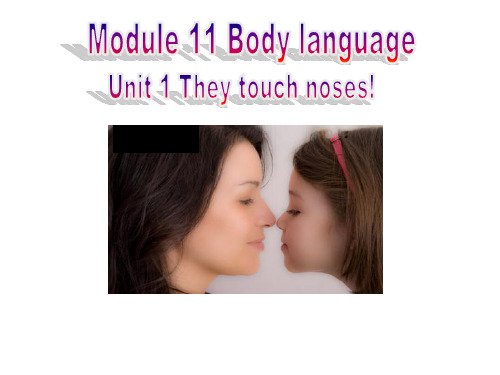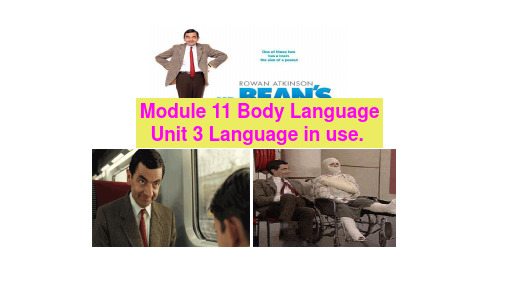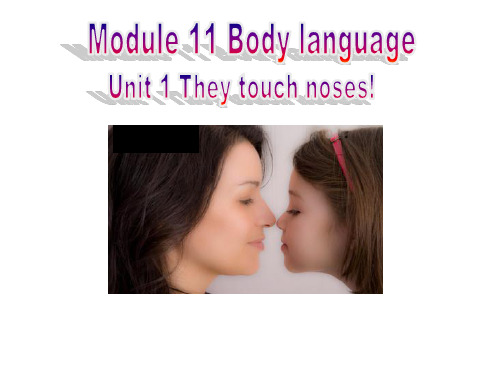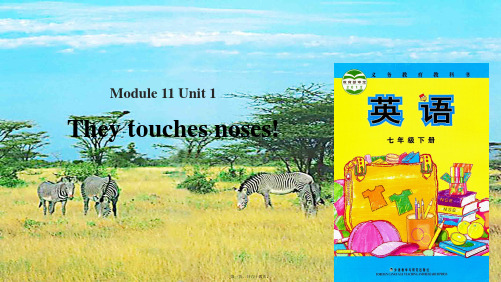七下英语 WY 课文原文Module 11 Body language
外研版七年级下册Module 11 Body language Unit 1 They touch noses!

A: We’re going to have some foreign teachers from Japan and Russia at school tomorrow, and I’m welcoming the visitors. How do I do that? B: You know, in Russia, people kiss three times, left, right, left. A: What! No, I didn’t know that. That’s interesting.
B: I … A: What will you do when you meet… in the future? B: I …
nod kiss bow
wave
hug smile shake hands
Smiling is the best body language and it is the bridge to the world.
B: That’s because people do different things in different countries.
Two students act and two make the conversation.
A: We’re going to have some teachers from ... and... at school tomorrow, and I’m welcoming the visitors. How do I do that? B: …
What do people in Japan usually do when they meet? B: They usually bow when they meet. A: Wow, there are so many ways of saying hello around the
七年级英语下册Module11BodylanguageUnit2BodyLanguage课件(新版)外研版

1. hold v. (held) 握着;使不动 ◆ South Americans sometimes hold your arm when they talk to you. ◆John held a knife in his hand. ◆ They will hold a meeting tomorrow.
Key sentences (关键句) P1 Here are some ways to welcome them.
P2 How close do you stand when you talk a friend?
P3 How about touching people? P4 Do you look at people when you talk?
Where are they from? They are from New Zealand.
Maybe
They are Maori. How do they greet?
They touch noses.
How close do you stand?
personal space
A When you talk to…
head ear neck arm hand leg
two feet
hair eye nose tooth
two teeth mouth
knee foot
1 Match the words with the parts of the body.
eye finger foot knee leg mouth
【探究总结】 hold的用法 作及物动词用,意为“握着;使不动;
举行;包含;容纳”,常构成短语:hold on意为“(打电话时)别挂断”;hold on to 意为“抓住不放;紧紧抓住” 。
外研版七年级英语下册Module 11 Body language 精品课件(共92张PPT)

wave
挥动; 挥舞
mean
意味着; 意思是
orangutan
猩猩
threw(throw的过去式)
扔; 扔掉
puzzled
迷惑的
abuse
骂人
beat his breast
捶胸
【我的感悟】 When in Rome, do as the Romans do. (入乡随俗。)
•
9、要学生做的事,教职员躬亲共做; 要学生 学的知 识,教 职员躬 亲共学 ;要学 生守的 规则, 教职员 躬亲共 守。2021/7/232021/7/23Friday, July 23, 2021
• 17、儿童是中心,教育的措施便围绕他们而组织起来。2021/7/232021/7/232021/7/232021/7/23
• 2、Our destiny offers not only the cup of despair, but the chalice of opportunity. (Richard Nixon, American President )命运给予我们的不是失望之酒,而是机会之杯。二〇二一年六月十七日2021年6月17日星期四 • 3、Patience is bitter, but its fruit is sweet. (Jean Jacques Rousseau , French thinker)忍耐是痛苦的,但它的果实是甜蜜的。10:516.17.202110:516.17.202110:5110:51:196.17.202110:516.17.2021 • 4、All that you do, do with your might; things done by halves are never done right. ----R.H. Stoddard, American poet做一切事都应尽力而为,半途而废永远不行6.17.20216.17.202110:5110:5110:51:1910:51:19 • 5、You have to believe in yourself. That's the secret of success. ----Charles Chaplin人必须相信自己,这是成功的秘诀。-Thursday, June 17, 2021June 21Thursday, June 17, 20216/17/2021
七年级英语下册Module11BodylanguageUnit1Theytouchnoses同步课件外研版

Ⅰ.从方框中选词填空,有的需要变换形式,每词限用一次
bow,shake,together,Russian,smile
1.He usually
to others because he is Japanese.
2.She
the juice before she drank it.
3.He met ten
3. (2017安徽芜湖二十九中期中)Our teacher says that many
(visit)
will come to our school next day.
4.She wanted to try Japanese food and
(India)food.
5.—What did they do?
例 根据汉语意思完成句子。每空一词
他向我微笑,并和我握手。
He smiled at me and
me.
解析 本题考查shake hands with sb.的固定搭配。
答案 shook hands with
知识点二 nod的用法 nod作动词,意为“点(头)”,可以作及物动词,也可以作不及物动
词。例如: He nodded when I asked if he understood. 当我问他是否懂了的时候,他点了点头。 She nodded her head when she passed me in the street. 她在街上与我擦肩而过时向我点了点头。 拓展 nod one's head 点头 注意 nod的过去式和过去分词是nodded,要双写结尾的d。有的动词的 过去式和过去分词要双写结尾的辅音字母,如stopped,dropped等。
Ⅱ.单项选择
七下英语-WY-课文原文Module-11-Body-language

Module 11 Body languageUnit 1 They touch noses!Lingling: We’re going to have some Russian teachers at school tomorrow, and I’m welcoming the visitors. How do I do that?Betty: Lingling, you know, in Russia, people usually kiss three times, left, right, left.Lingling: What! No, I didn’t know that. We Chinese often shake hands and smile when we meet visitors, and sometimes we nod our heads . But we neverkiss. Only parents and children do that.Betty: That’s because people do different things in dif ferent countries. Lingling: So what do people in the US usually do when they meet?Betty: In the US some people shake hands, and some kiss or hug each other. In India people put their hands together and nod their heads. And do yourknow what Maori people in New Zealand do when they meet? Lingling: No, What do they do?Betty: They touch noses!Unit2 Here are some ways to welcome them.Body language around the worldby Wang LinglingOur new foreign students are going to arrive very soon, and here are some ways to welcome them.How close do you stand when you talk to a friend? You can stand too close to people in the Middle East but don’t stand too close to North American! Give them more personal space.How about touching people? Chinese girls often walk arm in arm with their friends. South American sometimes hold your arm when they talk to you, so you can’t move away! But in Britain many people don’t like other people to touch themat all.Do you look at peo ple when you talk? In some places, it isn’t polite to look at people when they talk, but in other countries it isn’t polite to look somewhere else. In Britain and the US, people usually look at each other when they talk.And how do you say goodbye? That’s easy, wave to say goodbye. But be careful! In Greece, it’s not at all polite! In fact, it’s very rude!内容总结(1)Module 11 Body languageUnit 1 They touch noses(2)Betty: They touch noses。
Module 11 Body language-七年级英语下单元话题满分写作(外研版)

2021-2022学年七年级英语下学期单元话题满分写作Module 11: Body language单元话题:社交礼仪范文11.假如你叫李硕,你的美国笔友Cindy要来中国,她发电子邮件说想了解中国的一些社交礼仪。
请根据下面四幅图片及文字提示给她回复一封电子邮件。
shake handsit's rude to point at others with chopsticksarrive at the party on timedon't give a clock as a present注意:(1)邮件中须包括提示中的所有要点,可适当发挥,提示词语供参考;(2)邮件中不要出现真实的地名、校名和人名;(3)词数80左右,开头和结尾已经给出,不计入总词数。
Dear Cindy,I'm glad to know that you are coming to China.____________________________________________________________________________________________________________________________________________________________________________ ______________________________________________________________________________________ ______________________________________________________________________________________ ______________________________________________________________________________________范文22.在八年级即将结束之际, 八(1) 班将举行一次主题班会, 要求同学们谈谈一年来自己的收获与变化。
七年级英语下册Module11BodylanguageUnit1Theytouchnoses课件外研版

Module 11 Body language
Unit 1 They touch noses!
Lead in: have a discussion
In different countries, there are different ways of greeting (问候) when we meet visitors. Do you know what they are?
Homework
Think about some other ways of greeting in different countries.
编后语
有的同学听课时容易走神,常常听着听着心思就不知道溜到哪里去了;有的学生,虽然留心听讲,却常常“跟不上步伐”,思维落后在老师的讲解后。这两种情况都 不能达到理想的听课效果。听课最重要的是紧跟老师的思路,否则,教师讲得再好,新知识也无法接受。如何跟上老师饭思路呢?以下的听课方法值得同学们学习:
一、“超前思考,比较听课”
什么叫“超前思考,比较听课”?简单地说,就是同学们在上课的时候不仅要跟着老师的思路走,还要力争走在老师思路的前面,用自己的思路和老师的思路进行对 比,从而发现不同之处,优化思维。
比如在讲《林冲棒打洪教头》一文,老师会提出一些问题,如林冲当时为什么要戴着枷锁?林冲、洪教头是什么关系?林冲为什么要棒打洪教头?••••••
There are different languages __i_n__ d__if_fe_r_e_n_t_ c_o_u_n_t_r_i_es_.
外研版七年级英语下册Module 11 Body language Unit 1

when they
meet (6)__v_is_i_to_r_s.
Work in groups. Talk about what you do and say when you meet:
your teacher
your head teacher
your parents after school
your best friend
v.&n.吻;亲吻 v.点(头) n.头;头部 v.(shook)摇晃 握手 v.&n.微笑 adj.英国的;英国人的 n.德国人;德语; adj.德国的;德国人的;德语的
Presentation
Russian
visitor Russia hug each each other India together touch nose
What are they doing?
shake hands
touch noses
What are they doing?
bow
put hands together
What are they doing?
wave hands
give Hada
Presentation
kiss nod head shake shake hands smile British German
your best friend’s parents
your favourite film star
a visitor to your school an American
a Russian
Байду номын сангаас
I smile, and say good morning.
Language Points
外研版英语七年级下册Module 11 Body Language Unit 3 课件

Talk about do’s and don’ts in Britain.
Stand in line.
√
Shake hands.
√
Don’t Touch people.
x
Say “please” and “thank you”.
√
Don’t Ask a woman’s age.
x
Open doors for others.
How do you express…? I’m full. Come here. Don’t do something.
It’s me. Talk about some secrets. Lose face. (丢脸)
stamp the foot
In china, usually it means _______. In the west, it means _________.
A. impatient B. angry C. happy
(不耐烦的)
In china, in means ________. In the Middle East, it is _______.
A. sorry B. rude C. comfort(安慰)
slap on the back
What does bow mean in Japan?
A. Looks
B. To look
C. Look ing
D. Look
( A)4. ________ be late for school again.
A. Don’t
B. Doesn’t
C. Do
D. Does
(B)5. ________ go and play basketball.
外研版七年级下册Module 11 Body language Unit 1 They touch

When in Rome, do as the Romans do .入乡随俗。
碰鼻礼是毛利人传 统的打招呼方式, 也是一种表达真挚 问候的礼仪。行礼 时,相互问候的两 个人要鼻尖相碰, 表示交换双方的呼 吸,使之融合在一 起。毛利人是新西 兰的原住民,他们 有自己独特的生活 方式和文化。
What do people in Japan usually do when they meet? B: They usually bow when they meet. A: Wow, there are so many ways of saying hello around the world. B: That’s because people do different things in different countries.
when they meetv_is_it_o_rs.
In New Zealand, Maori people touch noses.
Lingling: We’re going to have some Russian teachers at school tomorrow, and I’m welcoming the visitors. How do I do that? Betty: Lingling, you know, in Russia, people usually kiss three times, left, right, left. Lingling: What! No, I didn’t know that.
七年级英语下册 Module 11 Body language Unit 2 Here are so

Unit 2 Here are some ways to welcome them.
Lead in
What body language do you know?
Let’s look at these pictures.
Presentation
finger n.手指
Some phrases
1. (be) close to 2. arm in arm 距离……近 臂挽臂
3. move away
4. not at all 5. in fact 6. what about…
搬走
一点儿也不 事实上 ……怎么样
Practice
Ⅰ.根据句意和汉语提示填单词 polite (礼貌的) to the old. 1. We should be _______ language (语言). 2. We learn English as our second _________ personal (个人的) 3. Don’t ask the foreigners about their _________ questions. 4. He ________ waved (挥手) his hands and then left. fact 5. In ________ (事实上), he is a clever boy.
不列颠;英国
一点儿也不 adj.礼貌的
somewhere
wave fact
adv.某处;某个地方
v.挥(手);招(手);摆(手) n.事实;细节
in fact
bring
事实上
v.(brought)带来
eye mouth finger knee leg foot
七下Module11《Body language》(Unit3)1

Shake hands when you meet a friend.Stand in line..Please talk about the weather.Say “please” and “thank you”.Look at people when you talk
Don’t touch people.Don’t ask people personal question.Don’t ask women’s age.Don’t talk with food in your mouth.Don’t be late.
三、祈使句的结构:◇肯定形式:以动词原形开头,无时态和数的变 化。 Stop! 停! Hurry up! 快点! Please don’t do it.请不要这么做。◇否定形式: 1、祈使句的否定形式是在动词原形前加don’t。 2、No+名词或 动词-ing,用来表示禁止性的祈 使句。 Don’t be late again. 不要再迟到了。 No smoking.禁止吸烟!
一、选择题
√
√
√
4. “_______ exercise every day, my child. It’s good for your health,” Father said. A. Taking B. To take C. Take D. Takes5. Don’t _______ too much TV. It’s bad for your eyes. A. watch B. watched C. watching D. to watch6. ________ sleep too late. It’s bad for your health. A. Do B. Not C. Don’t D. Please not
七年级英语下册module11bodylanguageunit1theytouchesnoses

第三十六页,共六十四页。
3. each pron. 各个(gègè),每个 ◆ In the US some people shake hands, and some kiss or hug each other.
◆ He gave a book to each of his parents.
◆ He gave each boy an apple.
2021/12/13
第三十页,共六十四页。
Language points
1. in Russia, people usually kiss three times.
2021/12/13
“times” 在这里表示 次数, (biǎoshì) three times 表 示 “三次”。在英文中, 一次, once
shake hands
第五页,共六十四页。
2021/12/13
bow
第六页,共六十四页。
2021/12/13
kiss
第七页,共六十四页。
We know
People from different countries have different ways of body languages to greet each other. Look at the following pictures.
笑;laugh一般
是有声的笑、大笑,laugh____ a是t 嘲笑。
2021/12/13
第三十四页,共六十四页。
【图解(tújiě)助记】
2021/12/13
laugh
smile
第三十五页,共六十四页。
学以致用 】 【
(xué yǐ zhì yòng)
①Our teacher came into the classroom ______.
- 1、下载文档前请自行甄别文档内容的完整性,平台不提供额外的编辑、内容补充、找答案等附加服务。
- 2、"仅部分预览"的文档,不可在线预览部分如存在完整性等问题,可反馈申请退款(可完整预览的文档不适用该条件!)。
- 3、如文档侵犯您的权益,请联系客服反馈,我们会尽快为您处理(人工客服工作时间:9:00-18:30)。
Module 11 Body language
Unit 1 They touch noses!
Lingling: We’re going to have some Russian teachers at school tomorrow, and I’m welcoming the visitors. How do I do that?
Betty: Lingling, you know, in Russia, people usually kiss three times, left, right, left.
Lingling: What! No, I didn’t know that. We Chinese often shake hands and smile when we meet visitors, and sometimes we nod our heads . But we never
kiss. Only parents and children do that.
Betty: That’s because people do different things in dif ferent countries. Lingling: So what do people in the US usually do when they meet?
Betty: In the US some people shake hands, and some kiss or hug each other. In India people put their hands together and nod their heads. And do your
know what Maori people in New Zealand do when they meet? Lingling: No, What do they do?
Betty: They touch noses!
Unit2 Here are some ways to welcome them.
Body language around the world
by Wang Lingling Our new foreign students are going to arrive very soon, and here are some ways to welcome them.
How close do you stand when you talk to a friend? You can stand too close to people in the Middle East but don’t stand too close to North American! Give them more personal space.
How about touching people? Chinese girls often walk arm in arm with their friends. South American sometimes hold your arm when they talk to you, so you can’t move away! But in Britain many people don’t like other people to touch them at all. Do you look at peo ple when you talk? In some places, it isn’t polite to look at people when they talk, but in other countries it isn’t polite to look somewhere else. In Britain and the US, people usually look at each other when they talk.
And how do you say goodbye? That’s easy, wave to say goodbye. But be careful! In Greece, it’s not at all polite! In fact, it’s very rude!。
